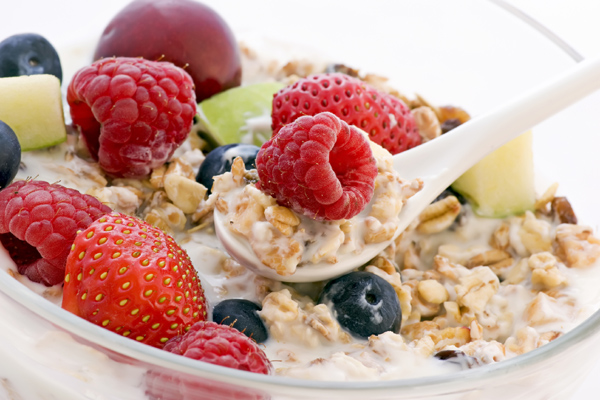
Eating Low Fat Foods
Do you know which foods are low fat and which are not? Are you eating low fat foods as part of a diet? Find out a little bit more of this food type that's growing in popularity.
Eating low fat foods and recipes can help you to lose weight. People usually consume such foods in an attempt to reduce the risk of developing certain conditions such as heart disease, high cholesterol, hypertension, some cancers and diabetes.
Good examples of low fat foods include bread, pasta, rice and cereals as well as dairy products such as non fat milk, yogurt and lean meat, poultry, fish, beans, pulses, eggs, vegetables, fruits and nuts. Refined or processed low fat foods are foods that should generally be avoided wherever possible. These contain many calories and sometimes as many if not more than their full-fat counterparts.
Some people make the mistake of eating more of low fat foods simply due to them being labeled as low in fat. Calories from these foods or full fat foods when consumed in excess will result in weight gain.
However an excessively low fat diet may result in deficiency diseases relating to the lack of essential fatty acids. With too little fat in the diet, the body may not be able to properly absorb fat soluble nutrients such as vitamins A, D, E and K and beta carotene. These nutrients are important for various processes that occur within the body.
Name The Type of Fats
You should really try to avoid saturated fats that are usually located in red meat and dairy products. These cause the elevation of blood cholesterol levels which increase the risk of developing heart disease, heart attacks and strokes.
Polyunsaturated fats are found in such foods as vegetable oils, sunflower oils and safflower oils. These can lower cholesterol. Fish oils and olive oils have been associated with a reduction of risk of developing heart disease. These contain monounsaturated fats which are even healthier for you.
Hydrogenated oils are found predominantly in refined and processed foods. Used also in fried foods and fast foods, these types of fats can increase greatly your chances of developing heart disease. Wherever possible, avoid these fats and consume unrefined foods to limit your risk of developing heart disease, heart attacks and strokes.
Most Popular
- › Slimming Guides & Articles
- › Weightwatchers Review
- › Eating Disorders Relating to Weight Loss
- › The Risks of Dieting
- › Personal Training Workouts
- › Your Calorie Intake for Weight Loss
- › Eating Healthy Foods
- › Increase Metabolism with Exercise
- › Artificial Sweeteners as a Sugar Replacement
- › The Effects of Alcohol on Your Health & Weight
You may also be interested in...
Fancy a Low Fat Diet?
Learn more about what a low fat diet actually means in reality! If you fancy this route for your slimming program, then read what's involved so you know exactly what you are letting yourself in for.What are Low Fat Diet Plans?
When you’re trying to lose weight, low fat diet plans seem to make a lot of sense – surely eating less fat will make you, well, less fat? Get the low down on these diets now.Eating Healthy Foods
Find more on eating healthy foods and how to look for nutritional foods. Slimming.co.uk has informative slimming and dietary advice whatever your requirements.Healthy Fats
Check out how healthy fats for your body are a key component in your eating plans in order to lose weight.Eating the Right Foods
Discover how Eating the right diet foods can really help you combat overweight. With slimming you can speed up the results and get health back quicker...
